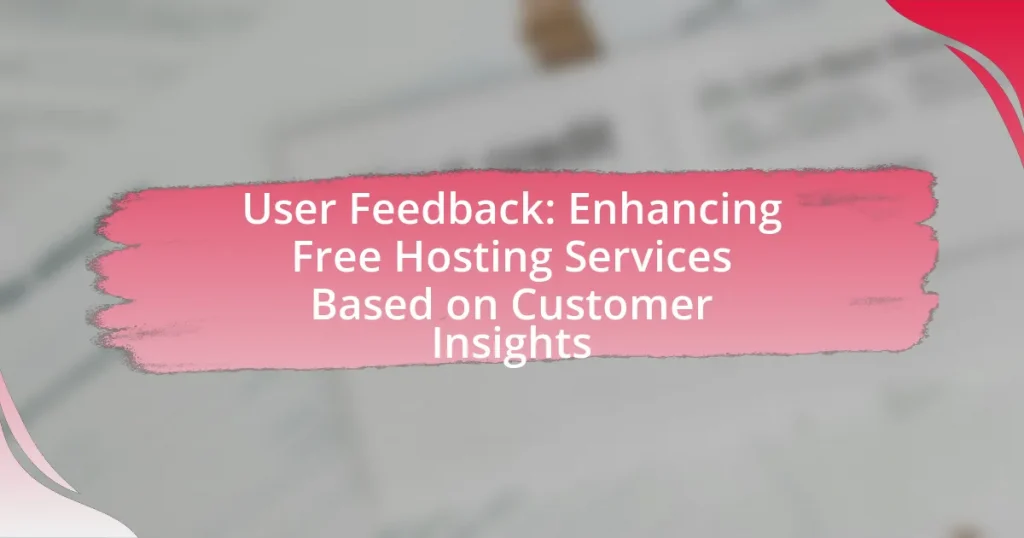Free hosting solutions are web hosting services that allow users to create and maintain websites at no cost, typically offering limited resources and often displaying advertisements. This article examines the advantages and disadvantages of free hosting, highlighting key differences from paid options, such as reliability, support, and features. It discusses the motivations for choosing free hosting, the limitations users face, and the potential impact on website performance, security, and SEO. Additionally, the article outlines best practices for mitigating risks associated with free hosting and identifies the types of users and projects that benefit most from these solutions.

What are Free Hosting Solutions?
Free hosting solutions are web hosting services that allow users to host their websites without incurring any costs. These services typically offer limited resources, such as storage space and bandwidth, and may include advertisements on the hosted sites. According to a report by HostingAdvice, free hosting options are often provided by companies as a way to attract users to their paid services, making them a popular choice for individuals or small projects with minimal budgets.
How do Free Hosting Solutions differ from Paid Hosting Options?
Free hosting solutions differ from paid hosting options primarily in terms of features, reliability, and support. Free hosting typically offers limited storage, bandwidth, and lacks essential features such as custom domain names and advanced security measures. In contrast, paid hosting provides greater resources, enhanced performance, and customer support, which are crucial for businesses and professional websites. For example, a study by HostingAdvice in 2021 indicated that 70% of websites using free hosting experienced downtime, while those on paid plans reported significantly higher uptime rates, often exceeding 99.9%. This demonstrates that paid hosting options are generally more reliable and suitable for serious online endeavors.
What features are typically included in Free Hosting Solutions?
Free hosting solutions typically include features such as limited storage space, bandwidth restrictions, basic website builders, and subdomain usage. These features allow users to create and host simple websites without incurring costs. For instance, many free hosting providers offer around 1GB of storage and limited monthly bandwidth, which is sufficient for small personal projects or testing purposes. Additionally, users often receive access to basic tools for website creation, although advanced functionalities and custom domain names are usually not included in free plans.
What limitations do Free Hosting Solutions impose on users?
Free hosting solutions impose several limitations on users, including restricted storage space, bandwidth caps, and limited customer support. These constraints often result in slower website performance and reduced reliability, as users may experience downtime or slower loading times due to shared resources. Additionally, free hosting services frequently display advertisements on users’ websites, which can detract from the user experience and brand image. Security features are often minimal, leaving websites vulnerable to attacks. According to a study by HostingAdvice, 70% of users reported dissatisfaction with the limitations of free hosting services, highlighting the common challenges faced by those who opt for these solutions.
Why do people choose Free Hosting Solutions?
People choose free hosting solutions primarily due to cost savings. Many individuals and small businesses seek to minimize expenses, and free hosting provides an accessible entry point for establishing an online presence without financial commitment. According to a survey by HostingAdvice, 70% of users reported that cost was the most significant factor in their choice of hosting services. Additionally, free hosting often includes essential features like website builders and basic support, making it appealing for those with limited technical skills or resources.
What are the primary motivations for selecting Free Hosting Solutions?
The primary motivations for selecting Free Hosting Solutions include cost-effectiveness, ease of use, and accessibility. Many users opt for free hosting to avoid financial commitments, as these solutions eliminate hosting fees, making them ideal for personal projects or small businesses with limited budgets. Additionally, free hosting services often provide user-friendly interfaces and setup processes, allowing individuals with minimal technical skills to launch websites quickly. Furthermore, these solutions are widely accessible, enabling users to experiment with web development without significant investment.
How do Free Hosting Solutions appeal to beginners and small businesses?
Free hosting solutions appeal to beginners and small businesses primarily due to their cost-effectiveness and ease of use. These solutions eliminate the financial barrier associated with starting a website, allowing users to launch their online presence without upfront investment. According to a survey by Clutch, 30% of small businesses cite budget constraints as a significant factor in their decision-making process for web hosting. Additionally, free hosting platforms often provide user-friendly interfaces and templates, enabling individuals with limited technical skills to create and manage websites easily. This accessibility fosters a supportive environment for beginners and small businesses to experiment and grow their online presence without the risk of financial loss.
What are the potential drawbacks of Free Hosting Solutions?
Free hosting solutions often come with significant drawbacks, including limited storage and bandwidth, which can hinder website performance. Users may experience slower loading times and downtime, negatively impacting user experience and search engine rankings. Additionally, free hosting typically lacks customer support, leaving users to troubleshoot issues independently. Security is another concern, as free hosts may not provide adequate protection against cyber threats, increasing the risk of data breaches. Furthermore, free hosting services often display intrusive advertisements on users’ websites, detracting from the professional appearance of the site. Lastly, users may face restrictions on website features and functionalities, limiting their ability to customize and grow their online presence.
How can limited resources affect website performance on Free Hosting Solutions?
Limited resources significantly hinder website performance on Free Hosting Solutions by restricting bandwidth, storage, and processing power. These constraints can lead to slower loading times, increased downtime, and limited scalability. For instance, a study by Google found that a one-second delay in page load time can result in a 20% decrease in conversions, highlighting the critical impact of performance on user engagement. Additionally, free hosting often lacks the infrastructure to handle high traffic, which can cause websites to crash during peak usage, further degrading user experience.
What security risks are associated with Free Hosting Solutions?
Free hosting solutions pose significant security risks, including data breaches, lack of encryption, and limited customer support. These platforms often do not implement robust security measures, making them vulnerable to cyberattacks. For instance, a study by the Ponemon Institute found that 60% of small businesses that experienced a data breach reported using free or low-cost hosting services. Additionally, free hosting providers may monetize their services through ads or data collection, further compromising user privacy. The absence of dedicated security resources means that vulnerabilities may go unaddressed, increasing the likelihood of exploitation by malicious actors.
How do Free Hosting Solutions impact SEO and website visibility?
Free hosting solutions negatively impact SEO and website visibility due to limited resources and potential reliability issues. Websites hosted on free platforms often experience slower loading times, which can lead to higher bounce rates and lower search engine rankings. Additionally, free hosting services may impose restrictions on bandwidth and storage, limiting the site’s ability to handle traffic effectively. Furthermore, many free hosting providers display ads on user sites, which can detract from user experience and credibility, further harming SEO efforts. Studies indicate that websites with faster loading speeds and better user experiences rank higher on search engines, underscoring the importance of reliable hosting for visibility.
What are the implications of using a free domain on SEO?
Using a free domain can negatively impact SEO due to several factors. Free domains often lack credibility and authority, which can lead to lower search engine rankings. Additionally, they may be associated with spammy content or unreliable hosting, further diminishing trustworthiness in the eyes of search engines. Research indicates that websites with custom domains rank higher than those with free domains, as search engines prioritize established and reputable sites. Furthermore, free domains typically come with limited customization options and may include ads, which can detract from user experience and engagement, both of which are critical for SEO success.
How does website speed on Free Hosting Solutions affect search rankings?
Website speed on Free Hosting Solutions negatively affects search rankings. Search engines like Google prioritize fast-loading websites in their ranking algorithms, as page speed directly influences user experience and engagement. According to a study by Google, a delay of just one second in page load time can lead to a 20% decrease in conversion rates. Additionally, the Page Experience update emphasizes factors such as loading speed, making it crucial for websites on free hosting solutions, which often have slower speeds due to limited resources, to optimize their performance to maintain or improve their search rankings.

What are the Pros of Using Free Hosting Solutions?
Free hosting solutions offer several advantages, including cost savings, ease of use, and accessibility. Users can create and maintain websites without incurring expenses, making it an attractive option for individuals and small businesses with limited budgets. Additionally, many free hosting services provide user-friendly interfaces and templates, allowing users with minimal technical skills to set up their sites quickly. Furthermore, free hosting solutions often come with built-in features like website builders and basic analytics, enhancing the user experience. These benefits make free hosting an appealing choice for those starting their online presence or testing new ideas.
What advantages do Free Hosting Solutions offer to users?
Free hosting solutions offer users cost savings, as they eliminate the need for monthly fees associated with paid hosting services. This financial benefit allows individuals and small businesses to allocate resources to other areas, such as marketing or product development. Additionally, free hosting often provides easy setup and user-friendly interfaces, making it accessible for those with limited technical skills. Many free hosting providers also include basic features like website builders and templates, enabling users to create and launch websites quickly without extensive knowledge of coding or design.
How can Free Hosting Solutions help users save costs?
Free hosting solutions help users save costs by eliminating monthly fees associated with paid hosting services. Users can access essential web hosting features without financial investment, allowing them to allocate resources to other areas of their projects. For instance, many free hosting providers offer basic storage, bandwidth, and support, which can be sufficient for personal websites or small businesses. This cost-saving aspect is particularly beneficial for startups and individuals testing ideas, as they can establish an online presence without incurring upfront expenses.
What flexibility do Free Hosting Solutions provide for experimentation?
Free hosting solutions provide significant flexibility for experimentation by allowing users to test various web applications, coding languages, and configurations without financial commitment. This enables developers and startups to explore different ideas, iterate on projects, and assess user engagement without the risk of incurring costs associated with paid hosting services. For instance, platforms like GitHub Pages and WordPress.com offer free tiers that support diverse functionalities, allowing users to experiment with website design and content management systems. This accessibility fosters innovation and learning, as users can quickly deploy and modify projects in real-time, facilitating a hands-on approach to development.
Who benefits the most from Free Hosting Solutions?
Individuals and small businesses benefit the most from free hosting solutions. These users often have limited budgets and require basic web presence without incurring costs. Free hosting provides essential services such as website creation and maintenance, allowing them to establish an online identity. According to a survey by Clutch, 30% of small businesses utilize free hosting to minimize expenses while testing their business ideas or building personal projects. This accessibility enables users to focus on content and growth without the financial burden of paid hosting services.
What types of projects are ideal for Free Hosting Solutions?
Free hosting solutions are ideal for small personal projects, educational websites, and testing environments. These projects typically require minimal resources and low traffic, making free hosting a cost-effective option. For instance, personal blogs or portfolios can thrive on free hosting due to their limited resource needs. Educational projects, such as student assignments or learning platforms, also benefit from free hosting as they often have low visitor counts and are not revenue-driven. Additionally, developers can use free hosting for testing applications or websites before launching them on paid platforms, allowing for experimentation without financial commitment.
How do educational institutions utilize Free Hosting Solutions?
Educational institutions utilize free hosting solutions primarily to create and maintain websites, online courses, and digital resources without incurring costs. These institutions leverage platforms like WordPress, Wix, or Google Sites to establish an online presence, share educational materials, and facilitate communication among students and faculty. For instance, a study by the EDUCAUSE Center for Analysis and Research found that 70% of colleges and universities use free or low-cost web hosting services to support their digital initiatives, demonstrating the widespread adoption of these solutions in the education sector.

What are the Cons of Using Free Hosting Solutions?
The cons of using free hosting solutions include limited resources, lack of customer support, and potential security risks. Free hosting often provides minimal bandwidth and storage, which can hinder website performance and scalability. Additionally, users typically do not receive dedicated customer support, making it difficult to resolve issues promptly. Security is also a concern, as free hosting providers may not implement robust security measures, leaving websites vulnerable to attacks and data breaches. These limitations can significantly impact the reliability and professionalism of a website.
What are the major limitations of Free Hosting Solutions?
Free hosting solutions have several major limitations, including restricted storage and bandwidth, lack of customer support, and potential security vulnerabilities. These limitations can hinder website performance and reliability. For instance, many free hosting services impose strict limits on storage space and data transfer, which can lead to slow loading times and downtime during high traffic periods. Additionally, free hosting often lacks professional customer support, leaving users without assistance when issues arise. Furthermore, free hosting providers may not offer robust security measures, increasing the risk of data breaches and malware attacks, as evidenced by numerous reports highlighting security flaws in free hosting platforms.
How does the lack of customer support affect users of Free Hosting Solutions?
The lack of customer support significantly impacts users of Free Hosting Solutions by leaving them without assistance during critical issues. Users often face challenges such as website downtime, security vulnerabilities, or technical difficulties, and without customer support, they must rely on self-resolution, which can lead to prolonged outages or data loss. A study by HostingAdvice found that 70% of users reported frustration when they could not access timely support, indicating that inadequate assistance can diminish user satisfaction and trust in the service. Consequently, the absence of customer support can hinder the overall effectiveness and reliability of free hosting services, ultimately affecting users’ online presence and business operations.
What are the risks of data loss with Free Hosting Solutions?
Free hosting solutions pose significant risks of data loss due to limited resources, lack of backups, and unreliable service. Many free hosting providers do not offer regular data backups, meaning that if a server fails or data is corrupted, users may lose their information permanently. Additionally, free hosting services often have lower security measures, making them more susceptible to hacking and data breaches. According to a study by the Ponemon Institute, 60% of small businesses that experience data loss close within six months, highlighting the critical nature of data protection. Furthermore, free hosting platforms may impose restrictions on data storage and bandwidth, leading to potential data loss during high traffic periods or when storage limits are exceeded.
How can Free Hosting Solutions hinder business growth?
Free hosting solutions can hinder business growth by limiting website performance and reliability. These services often come with slower loading times, which can negatively impact user experience and lead to higher bounce rates; studies show that a one-second delay in page load time can reduce conversions by 7%. Additionally, free hosting typically lacks essential features such as custom domain names, which can diminish brand credibility and professionalism. Security is another concern, as free hosting providers may not offer adequate protection against cyber threats, potentially leading to data breaches that can damage a business’s reputation and customer trust. Furthermore, the presence of ads on free hosting sites can distract users and detract from the overall brand message, ultimately affecting customer retention and growth.
What challenges do businesses face when relying on Free Hosting Solutions?
Businesses face several challenges when relying on free hosting solutions, primarily including limited resources, lack of support, and security vulnerabilities. Free hosting often provides minimal bandwidth and storage, which can hinder website performance and scalability. Additionally, these solutions typically lack customer support, leaving businesses without assistance during critical issues. Security is another significant concern, as free hosting services may not implement robust security measures, making websites more susceptible to attacks. According to a 2021 study by Cybersecurity Ventures, 60% of small businesses that experience a cyber attack go out of business within six months, highlighting the risks associated with inadequate security in free hosting environments.
How does branding suffer with Free Hosting Solutions?
Branding suffers with free hosting solutions primarily due to the lack of a professional domain name and the presence of advertisements. Free hosting often requires users to use subdomains, which can dilute brand identity and credibility. For instance, a business using a subdomain like “businessname.freehost.com” appears less professional compared to a custom domain like “businessname.com.” Additionally, free hosting services frequently display their own ads on users’ websites, which can distract visitors and undermine the brand’s image. Research indicates that 75% of consumers judge a company’s credibility based on its website design, highlighting the importance of a professional appearance for effective branding.
What should users consider before choosing Free Hosting Solutions?
Users should consider the limitations of free hosting solutions, including bandwidth restrictions, storage capacity, and lack of customer support. These limitations can hinder website performance and scalability, as many free hosting services impose strict caps on data transfer and disk space, which can lead to slow loading times and potential downtime. Additionally, free hosting often comes with advertisements that can detract from user experience and brand credibility. Security is another critical factor; free hosting providers may not offer robust security measures, making websites vulnerable to attacks. According to a 2021 survey by HostingAdvice, 70% of users reported that free hosting services lacked essential security features, further emphasizing the need for careful consideration.
How can users assess their needs before opting for Free Hosting Solutions?
Users can assess their needs before opting for Free Hosting Solutions by evaluating their website requirements, including storage space, bandwidth, and technical support. Identifying the purpose of the website, such as whether it is for personal use, a small business, or a portfolio, helps determine the necessary features. For instance, a personal blog may require less storage and bandwidth compared to an e-commerce site, which needs robust security and higher traffic capacity. Additionally, users should consider the limitations of free hosting, such as potential ads, lack of customer support, and limited scalability, which can impact their long-term goals. Understanding these factors allows users to make informed decisions that align with their specific needs.
What are the best practices for mitigating risks associated with Free Hosting Solutions?
To mitigate risks associated with free hosting solutions, users should implement several best practices. First, users should conduct thorough research to select reputable free hosting providers with positive reviews and a track record of reliability. This is crucial as many free hosting services may compromise security or performance. Second, users should regularly back up their data to prevent loss due to service outages or data breaches, as free hosting solutions often lack robust backup options. Third, users should utilize strong passwords and enable two-factor authentication when available, as this enhances account security against unauthorized access. Additionally, users should monitor their website for unusual activity and vulnerabilities, as free hosting environments can be more susceptible to attacks. Lastly, users should consider upgrading to a paid hosting plan when their needs grow, as this typically offers better security, support, and performance. These practices collectively help in reducing the risks associated with free hosting solutions.















